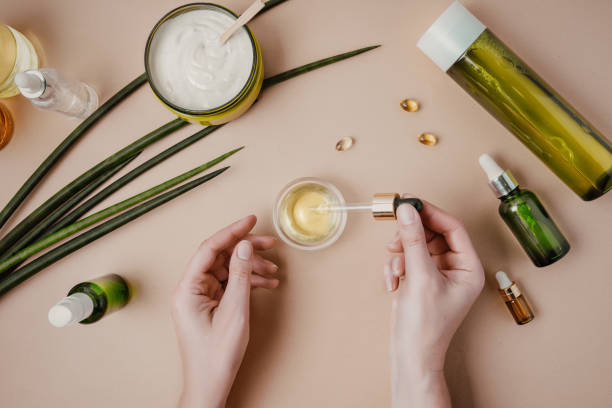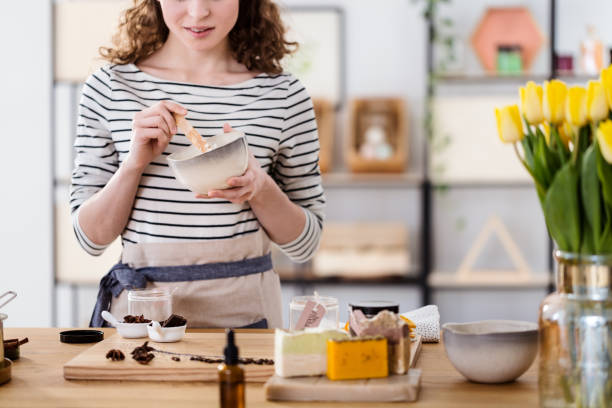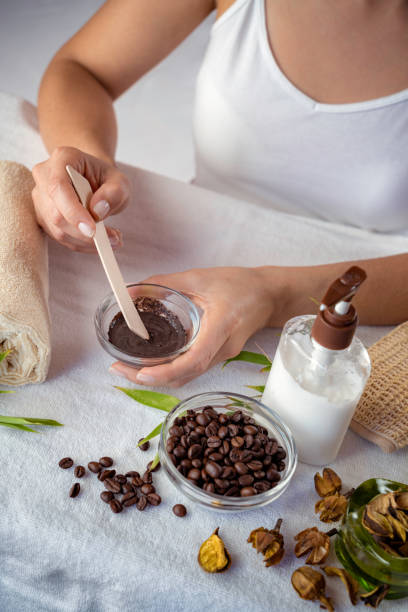Are you sick of using cosmetic products from the shop that contain chemicals and mystery ingredients? Discover the key to radiant health with herbal beauty remedies you make at home. Here, we’ll take you on a journey and show you the easy yet powerful ways how to make homemade beauty products from herbs for your skin and hair.
We’ll go over the many uses of many herbs, from calming aloe vera to stimulating rosemary. Discover the art of making delicious masks, toners, and balms that address your skin’s specific concerns. For those who share my enthusiasm for eco-friendly cosmetics, I’ll happily offer advice based on my experience. Enjoy the natural splendor of herbs and treat yourself to the world’s best-kept beauty secrets. The transformational power of handmade herbal beauty products can bring out your inner radiance.
Understanding the Healing Properties of Herbs
The historical context of herbs is crucial to comprehending their curative power. Herbal treatments have a long history of use by ancient cultures all throughout the world, and this knowledge has been passed down through the ages. Herbal medicinal traditions, such as TCM in China and Ayurveda in India, have endured for millennia, and their expertise is increasingly being recognized in contemporary holistic medicine.
The molecular basis of herbal medicine is now being elucidated by modern research. Many herbs, including those used for medicinal purposes, have been shown to contain bioactive chemicals such as alkaloids, flavonoids, and essential oils. Once we learn how these substances work pharmacologically, we may use them for everything from general health to the treatment of specific illnesses.
The ability to properly prepare and use herbs is a crucial life skill. We’ll walk you through how herbs can be used, from infusions and tinctures to external treatments. To further guarantee that you may harness the healing power of herbs responsibly, we will also discuss any possible herb-drug interactions and contraindications.
How Herbs Nourish and Protect the Skin Naturally
Herbs offer a bounty of natural nourishment and protection for the skin. They are rich in vitamins, minerals, and antioxidants that promote skin health and combat environmental damage. Antioxidants present in herbs neutralize free radicals, preventing premature aging and maintaining a youthful appearance. Herbs also possess anti-inflammatory properties, soothing irritated skin and reducing redness.
Additionally, their antimicrobial and antibacterial qualities help fight acne-causing bacteria and other skin infections. You can tap into their regenerative abilities by incorporating herbs into skincare, boosting collagen production and promoting skin rejuvenation. Overall, herbs provide a gentle and effective way to maintain healthy, radiant skin without resorting to harsh chemicals.
How to Make Homemade Beauty Products from Herbs
The following guide below shows different methods on how to make homemade beauty products from herbs and the best herbs for skincare:
1-Herbal Infused Oils

Herbal-infused oils are created by steeping herbs in carrier oils, extracting their beneficial properties. These oils are a potent source of herbal goodness, offering various skincare benefits. From soothing chamomile-infused oil to revitalizing rosemary-infused oil, they provide natural nourishment and can be used in various homemade beauty products.
Selection of Carrier Oils and their Properties
There is a wide variety of carrier oils, each with unique properties to cater to different skincare needs.
- Jojoba Oil balances oily skin for a healthy complexion.
- Sweet Almond Oil nourishes and soothes sensitive skin.
- Coconut Oil moisturizes, treats dry skin, and aids hair care.
- Argan Oil hydrates and fights the effects of aging. It is high in antioxidants and fatty acids.
- Rosehip Oil helps reduce scars and rejuvenates the skin. It is rich in vitamins and vital fatty acids.
- Grapeseed Oil is ideal for oily or acne-prone skin because it is non-greasy and contains linoleic acid.
- Apricot Kernel Oil is soothing, anti-inflammatory, and suitable for sensitive and mature skin.
Choose the carrier oil that best complements your skin type and desired results for effective and natural skincare.
Step-by-Step Process for Creating Herbal-infused Oils
- Choose dried herbs for desired skincare benefits.
- Choose a carrier oil such as jojoba, sweet almond, or coconut oil to infuse the herbs.
- Crush or bruise dried herbs for better infusion.
- The herbs should be put in a clean, dry glass jar and covered with carrier oil for infusion. Completely close the jar.
- Use a double boiler to gently heat the jar for 1-2 weeks, stirring every so often, or expose it to sunlight.
- After infusing, filter the oil through a fine mesh to get rid of the remaining herb material.
- Transfer the herbal-infused oil into an opaque, dark bottle, and store it. Please put it in your handmade beauty products as a potent ingredient.
2-Soothing Herbal Face Masks
Herbal face masks that soothe the skin are a refreshing delight. They provide natural sustenance and relaxation and are made from a blend of relaxing herbs. Whether you select the chamomile, lavender, or aloe vera mask, it will leave your skin feeling nourished, invigorated, and shining. Ideal for a self-care routine!
Choosing Herbs based on Skin Type and Concerns
- Choose herbs like chamomile, calendula, and rosehip that offer deep hydration and alleviate dryness if you have dry skin.
- Oily or acne-prone skin can benefit from the antibacterial qualities of tea tree, lavender, and neem, which can control acne and oil production.
- Choose soothing herbs like chamomile, lavender, and oatmeal for sensitive skin to relax and lessen inflammation.
- Consider green tea, rose, and rosemary for their antioxidants and skin-rejuvenating qualities if you have aging skin.
You can customize your skincare regimen to target particular difficulties and attain a healthier, more radiant complexion by being aware of your skin’s demands and selecting the right herbs.
Recipes and Application Tips for Homemade Face Masks
See below the different ways on how to make homemade beauty products from herbs.

Avocado Hydrating Mask
Mix 1 mashed ripe avocado with 1 tablespoon each of honey and yogurt. Apply to freshly washed skin and let sit for 15 to 20 minutes. Use warm water to rinse.
Calming Cucumber and Aloe Mask
Blend 2 tbsp aloe vera gel and half a cucumber. After evenly applying the mixture, take 15 minutes to unwind. With cool water, rinse.
Other Facial Care Suggestions Using Herbs
- Mix turmeric powder, yogurt, and honey for a brightening face mask.
- Apply masks to clean skin, perform patch tests for sensitive or allergic skin, relax, avoid excessive talking, and moisturize after removal.
3-Herbal Hair Rinses and Treatments
Herbal hair rinses and treatments are natural remedies for hair health. From chamomile-infused rinses for blonde highlights to rosemary treatments for hair growth, these herbal solutions nourish and strengthen your hair, promoting shine and vitality. Incorporate them into your hair care routine for luscious and beautiful locks naturally.
Herbal Hair Rinse Recipes for Different Hair Types
Did you know that not all herbal products for hair are suitable for all types of hair? Here are some of the herbs appropriate for your hair type:
Chamomile Rinse for Blonde Hair
Pour heated water over chamomile flowers, let it cool, and then filter. After shampooing, apply the rinse to your hair and wait a short while before rinsing.
Rosemary Rinse for Hair Growth
Fresh or dried rosemary can be infused, cooled, and strained in boiling water. To promote hair development and add shine, rinse your hair after shampooing.
Lavender Rinse for Dry Hair
Lavender blossoms should be boiled, cooled, and strained. After washing, rinse to dampen hair to hydrate and nourish dry strands.
Preparing Herbal Hair Treatments for Nourishment and Shine
Herbal hair treatments are an excellent way to nourish and add shine to your hair naturally. Here’s a simple recipe to create a nourishing herbal hair treatment:
- 1 cup coconut oil
- 2 tablespoons amla powder (Indian gooseberry)
- 2 tablespoons fenugreek seeds
- 1 tablespoon hibiscus powder
Procedure:
- In a saucepan, heat the coconut oil until it melts.
- Add amla powder, fenugreek seeds, and hibiscus powder to the melted oil.
- Stir well and let the mixture simmer on low heat for 15 minutes.
- Remove from heat and allow it to cool and infuse for a few hours.
- Strain the mixture and store it in a clean, airtight jar.
- Massage the herbal treatment onto your scalp and through your hair. Leave it on for 30 minutes or overnight for deeper nourishment. Wash it off with a mild shampoo and enjoy the revitalizing effects of the herbal goodness for nourished, shiny hair.
4-Herbal Bath Infusions

Herbal bath infusions are a delightful way to relax and rejuvenate the body and mind. Adding a blend of dried herbs to your bathwater can create a soothing and aromatic experience. Lavender, chamomile, and rose petals are popular choices to transform your bath into a therapeutic herbal retreat.
How to Prepare Herbal bath Infusions for Relaxation
Create soothing herbal bath infusions for relaxation in your home using simple steps.
- 1 cup of dried herbs (lavender, chamomile, rose petals, etc.)
- Muslin or a large tea bag
Procedure:
- Mix your chosen dried herbs in a bowl.
- Fill the muslin or tea bag with the herbal blend and tie it securely.
- Hang the bag under the bathtub faucet and let hot water run through it.
- Allow the herbs to steep in the warm water for a few minutes.
- Once your bath is ready, immerse yourself in the herbal-infused water and relax for as long as you like.
Enjoy a soothing herbal-infused bath to unwind and reduce stress.
5-Herbal Salves and Balms
Herbal salves and balms are natural remedies for skin and minor ailments. They are created by infusing herbs into carrier oils and combining them with beeswax for a soothing and nourishing balm. These herbal concoctions offer a gentle and effective way to address various skin concerns and promote healing.
Formulating Herbal Balms for Lip Care and Dry Skin
Creating herbal balms for lip care and dry skin is a delightful and practical DIY project. Here’s a simple formulation to get you started:
- 1/4 cup coconut oil
- 1 tablespoon shea butter
- 1 tablespoon beeswax
- 1 teaspoon calendula-infused oil
- 1 teaspoon chamomile-infused oil
- 5-10 drops of essential oil (e.g., lavender, peppermint)
Procedure:
- Melt the coconut oil, shea butter, and beeswax in a double boiler until fully liquefied.
- Stir in the calendula-infused oil and chamomile-infused oil.
- Remove from heat and add the essential oil for fragrance.
- Pour the mixture into lip balm containers or small tins.
- Allow it to cool and solidify before using.
This herbal balm nourishes and moisturizes lips and dry skin, keeping them soft, smooth, and well-protected. Apply as needed throughout the day for soothing care.
6-Herbal Beauty Products for Hand and Foot Care
Herbal beauty products for hand and foot care offer natural solutions to keep these often-neglected areas pampered and rejuvenated. From herbal hand creams that nourish dry skin to foot soaks infused with aromatic herbs, these products provide a spa-like experience, leaving hands and feet feeling soft, refreshed, and well-taken care of.
Homemade Foot Soaks and Scrubs for Tired Feet
Homemade foot soaks and scrubs are a treat for tired feet, providing much-needed relaxation and rejuvenation. Here are two easy recipes:
- Soak feet in warm water with Epsom salt and peppermint essential oil for 15-20 minutes to relieve fatigue and swelling.
- Mix brown sugar, olive oil, lavender, or chamomile flowers in a foot scrub for exfoliation and smoother soles.
Regularly using these homemade foot soaks and scrubs will keep your feet pampered and revitalized.
Frequently Asked Questions
Q: How can I produce natural cosmetics at home?
A: The simplest method is to macerate herbs like calendula, chamomile, and lavender into carrier oils. Aloe vera can also be used directly from the plant, but you should preserve it right away. Marshmallow has gel-like properties, so it can be made into a decoction. You may also try these watch these steps to know how to make homemade beauty products from herbs:
Q: What are the six essential plant elements employed in herbal cosmetics?
A: Antioxidants, vitamins, essential oils, tannins, alkaloids, dyes, carbohydrates, and terpenoids are a few of the bioactive components found in plants that are utilized to make cosmetics for the care of the skin, body, and other body parts.
Q: How to produce natural cosmetics?
A: Natural cosmetics contain exclusive natural components, such as minerals and compounds with plant or animal origins. Additionally, the production involves processes including extraction, drying, lyophilization, screening, grinding, and lyophilization. They were pressing, filtration, extraction, drying, and drying.
Q: How do I launch my own herbal products company?
A: Providing classes on herb farming or the correct use of herbs is another practical approach to boost revenue. It would be best if you also created a legal entity. Next is to file taxes. Then open a company credit card and bank account before setting up your company’s accounts. Finally obtain all required licenses and permits.
Q: Which plants are utilized in cosmetics?
A: Cosmetic companies tend to use the following plants:
- Aloe Barbadensis
- Calendula officinalis
- Hibiscus rosa-sinensis
- Lavender
- Cucumber plant
- Malva (Matricaria chamomilla)
- Ocimum basilicum or basil
Final Thoughts
In conclusion, creating homemade beauty products from herbs can be a rewarding and natural way to enhance your skincare and haircare routines. Herbs possess numerous beneficial properties, such as anti-inflammatory, antioxidant, and moisturizing effects, making them ideal for addressing various beauty concerns. Research and choose herbs that suit your skin or hair type and specific needs. Common herbs like lavender, chamomile, aloe vera, and rosemary are great options.
Extract their essential oils or create infusions to incorporate into creams, lotions, and hair treatments. Remember to use high-quality carrier oils and natural ingredients to ensure the safety and effectiveness of your beauty products. Avoid using herbs that may cause allergies or irritations.
Experiment with different combinations and formulations to find the best fit. Store homemade products in dark containers to prolong shelf life. Enjoy the simplicity and eco-friendliness of natural herbal beauty products.

